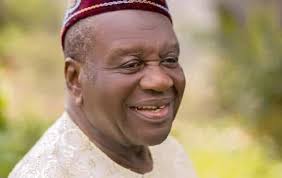Former Akwa Ibom Governor, Obong Victor Attah, has leveled a serious accusation against former President Olusegun Obasanjo, claiming that he sabotaged a groundbreaking initiative that could have provided 24-hour electricity to the state. Attah revealed that he had personally funded and constructed a 191-megawatt power plant in Akwa Ibom during his tenure, with the vision to supply uninterrupted power to the people of the South-South state. However, Attah alleges that Obasanjo intervened, halting the project from reaching its full potential.
Attah, who governed Akwa Ibom from May 1999 to May 2007, explained that the plant was designed to address the long-standing energy problems faced by the state and potentially serve as a model for other regions in Nigeria. In a recent appearance on Channels Television’s Inside Sources with Laolu Akande, Attah expressed his frustration over the decision, which he believes was politically motivated due to Nigeria’s flawed federal system.
“After I built the plant, the president said no,” Attah said, referring to the instruction by Obasanjo that the electricity generated from the Akwa Ibom plant be fed into the national grid rather than be distributed directly to the state. “I said, ‘I want to give Akwa Ibom State power,’ and I succeeded in building the power station. The president came, commissioned the plant, and everything seemed fine. But then he went back to Abuja and brought out a law that if you generate power, you cannot distribute it. I used Akwa Ibom money to build the plant, but I couldn’t give the people of Akwa Ibom the power they needed. Instead, I had to add it to the failing national grid.”
The former governor’s frustration is evident as he reflected on the missed opportunity for the state, which he claims could have led to the creation of a robust electricity infrastructure in the region. “If I had succeeded in distributing power directly to Akwa Ibom, it would have set a precedent. Other states would have followed suit,” Attah said. Unfortunately, the power supply envisioned for Akwa Ibom was never fully realized, contributing to the state’s continued struggles with unreliable electricity.
Attah’s claims are not just about a personal setback but are linked to his longstanding criticism of Nigeria’s federal arrangement. He believes that the issue goes beyond party politics and points to the underlying structural problems in the country’s governance system. “It does not say much about party politics; it speaks volumes about the constitution that we have,” Attah stated. He described the existing constitution as authoritarian and imposed by the military, rather than reflecting the aspirations of the nation’s founding fathers.
“We need to go back to an agreeable constitution by our founding fathers at Independence,” Attah stressed. “What we have today is not a federal constitution. It is centralized, and until we go federal, we will not make progress.” This statement is part of his broader call for constitutional reform in Nigeria, which he believes is essential for the country’s growth and decentralization of power.
Attah also referenced the recent statements made by Dr. Ngozi Okonjo-Iweala, Director-General of the World Trade Organization (WTO), who called for the decentralization of power generation and distribution in Nigeria. “That’s what I was trying to do,” Attah said, nodding to the alignment of his vision with international recommendations. “But because of the faulty federal arrangement, I was stopped.”
Despite the setbacks, Attah is optimistic about the future. He praised the Nigerian government for the recent amendments to the Electricity Act of 2023, which now allows states to generate and distribute electricity independently. This legislation could potentially empower states like Akwa Ibom to take control of their energy needs without the hindrance of a centralized federal system.
“The new law is a step in the right direction,” Attah said. “Now our governor, Umo Eno, is working hard to ensure that we have an Akwa Ibom power company that not only generates but distributes power to the people.”
This move comes at a time when Nigeria’s power sector continues to struggle with systemic inefficiencies. Despite efforts to privatize the electricity market, many Nigerians continue to experience unreliable power supply. The Nigerian Electricity Regulatory Commission (NERC) recently approved an increase in electricity tariffs, with the cost of power rising to about N250 per unit for Band A customers. The increasing prices of alternative fuels like petrol and diesel further complicate the situation, leaving consumers frustrated.
In 2024, NERC granted licenses to eight states to establish their own electricity regulatory commissions, a significant move towards decentralizing the power sector. States like Enugu, Ekiti, Ondo, Imo, Edo, Kogi, Oyo, and Lagos have now joined the ranks of states that can regulate, generate, and distribute electricity within their borders. This expansion is seen by many experts as a necessary step to boost industrialization and increase productivity in Nigeria.
“Power decentralization is key to Nigeria’s industrialization,” said Dr. Chidi Ugwu, a policy analyst based in Lagos. “States like Akwa Ibom can now tap into their local resources and provide stable power, which will create jobs and drive economic growth.”
While Attah’s ambitious vision for Akwa Ibom’s power sector was thwarted by federal intervention, his legacy lives on in the current push for energy reform. With a more favorable legislative environment, Akwa Ibom and other states may soon see the benefits of a more decentralized power sector.
However, Attah’s experience serves as a cautionary tale for many who have long advocated for a true federal system. As Nigeria grapples with economic and infrastructural challenges, the call for restructuring remains a central issue. Without significant changes to the nation’s constitutional framework, the vision of a prosperous and industrialized Nigeria may remain just that—merely a vision.

